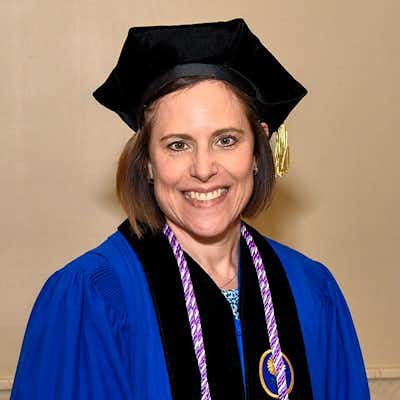Alison Simpson, PhD, WHNP-BC, RN
Alison Simpson, PhD, WHNP-BC, RN
Assistant Professor at the Wegmans School of Nursing, St. John Fisher College
2019 Graduate, PhD in Nursing & Health Science Program

"This experience was more difficult than I thought it was going to be but was also more rewarding than I imagined. I obviously learned about the research process but more importantly I learned a great deal about myself and formed some great relationships that will continue in the future as friendships and professional collaborations."
Talk about your nursing background.
My background is women’s health nursing. I worked at Highland Hospital on the maternity unit and I am a board-certified women’s health nurse practitioner. I have worked outpatient in private OB/GYN offices as well as clinics.
What made you want to pursue your PhD?
I was more interested in working in academia than clinical practice, so I decided a PhD was a more appropriate degree for my future goal of staying in academia. I am personally interested in nutrition and physical activity. Combining these interests with my background in women’s health seemed to make sense. Fortunately, these topics were a good match with the interests and background of my advisor, Sue Groth.
Tell us about your dissertation: Physical Activity During Pregnancy: An Examination of Women’s Beliefs, Self-Efficacy, and Intention.
Physical activity interests me personally. I often see pregnant women in the beginning stages of pregnancy at the gym but then as pregnancy advances I don't see them anymore. More often than not, I don't ever see them again so that means they don't come back in the postpartum period either. I wanted to try and find out why this may be happening.
In practice, it is my experience that many providers don't discuss physical activity with their pregnant patients as much as they discuss other topics such as nutrition, weight gain, and smoking cessation during pregnancy. My study didn't relate to why providers don't do this, but it may help explain why some women aren't active if they are not being educated on the topic.
What’s the value that the nursing perspective brings to research?
Compared with other health care providers, nurses spend such a large amount of time working directly with patients, they are in a unique position to see what the real challenges and problems are that impact patient outcomes. Nurses have the ability to thoroughly assess what patient needs are, which in turn helps guide research to examine significant patient issues.
How did mentorship help you succeed in the program?
Sue was an amazing mentor. She was a constant source of encouragement, guidance and support. I always felt that she was looking out for me when guiding me to make certain decisions or take next steps. Sue was very approachable and available whenever I needed advice or help. She included me in her research and projects which provided me the opportunity to work with other wonderful professionals who I learned from as well.
What’s next for you after graduation?
I will continue to work as an assistant professor at the Wegmans School of Nursing. I hope to collaborate with my colleagues at SJFC (who are also interested in and have backgrounds in women’s health) and work on projects that will positively impact women and their children right here in the Rochester community.
What will you carry forward with you?
At the end of your program, you will be judged on your research. Take advantage of opportunities during the program to present, publish, and get involved with grant writing. Start building your scholarship activities right from the beginning of the program.
Do you have any advice for future PhD students?
I would advise people that pursing a PhD is an amazing opportunity for personal and professional growth that will be difficult and frustrating at times but well worth it in the end. I would encourage anyone who wants to personally challenge him/herself and contribute to the growing body of knowledge in his/her discipline to pursue the degree. I would encourage people to pursue a PhD on a topic that they have a passion for. It certainly isn’t necessary, but it makes the process more meaningful and exciting.
This experience was more difficult than I thought it was going to be but was also more rewarding than I imagined. I obviously learned about the research process but more importantly I learned a great deal about myself and formed some great relationships that will continue in the future as friendships and professional collaborations.

